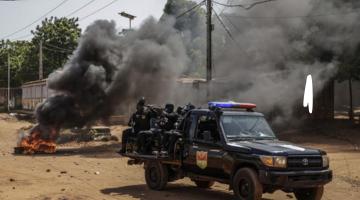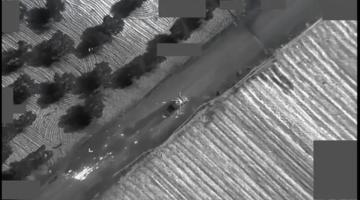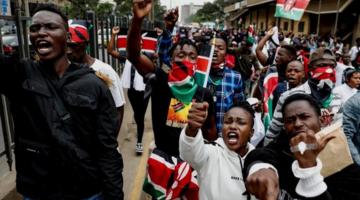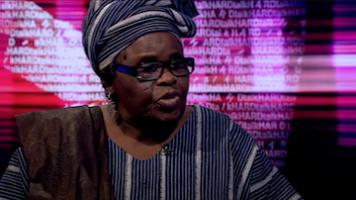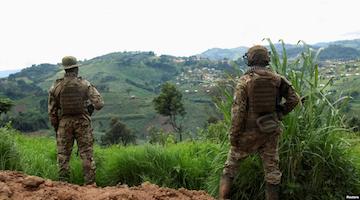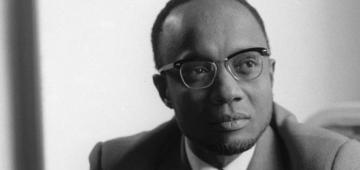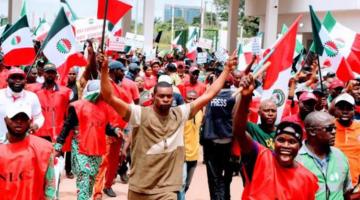Protest in Guinea-Bissau in November 2019 with a banner that reads "In democracy the people are in charge". Photo via RSF
Led by Amilcar Cabral, Guinea-Bissau was in the forefront of African anti-colonial movements. But independence for that nation in 1973 has been followed by continual struggle for true sovereignty and freedom from foreign intervention. Currently, opposition candidates are barred from contesting the November election in Guinea-Bissau as the “neocolonial agent”, Umaro Embalo, maneuvers to consolidate his ECOWAS-backed regime.
Originally published in People's Dispatch.
With the main opposition candidates barred from contesting, the election scheduled in Guinea-Bissau this November is at risk of becoming a farcical exercise, seemingly meant only to legitimize the unconstitutional regime of President Umaro Embalo.
Swearing himself in as the president at a hotel in February 2020, Embalo has since overseen an armed coup against the Supreme Court judges, dissolved the elected parliament, and dismissed the constitutional government, replacing it with one of his own choosing.
Orchestrating a crackdown on the protests by his political opponents, he had already held on to power well past the five-year term of a president, when the election was finally scheduled for November.
However, on September 24, amid the celebration of 52 years of Guinea-Bissau’s independence from Portuguese colonial rule, an unprecedented news: the party that had led its liberation struggle under the leadership of Amílcar Cabral was barred from contesting in the election.
Co-founded by Cabral in 1956, the African Party of the Independence of Guinea and Cape Verde (PAIGC) is the country’s largest party, and had the majority of seats in the parliament dissolved by Umbalo. It is Umbalo’s main challenger in the November election, leading a coalition, the PAI-Terra Ranka.
However, the Supreme Court of Justice, which also doubles as the Constitutional Court, rejected the application of its candidate, Simões Pereira, in a ruling on September 23.
The absurd
“It is the absurd becoming normal in our country,” Pereira described the reasons given by the Supreme Court to block his candidacy – namely that his application submitted by the coalition on September 19 was too late to meet the deadline of September 25.
After sitting on his application for four days without assessing it, the court cited a lack of time as the reason for rejection.
“The PAI Terra Ranka parties only submitted the documents on the 19th (a Friday), when there were only three business days left, September 22nd, 23rd, and 25th, until the deadline,” the Supreme Court explained in a statement on September 25.
“If there are irregularities,” it went on to reason, “they would have to be notified in order to eliminate them within 72 hours, which in this specific case would have exceeded the deadline for submitting the application itself.”
However, “nothing prevents” the coalition’s parties “from running individually, as long as they do so within the deadline, which ends today at 4:00 pm,” added its statement, issued only a few hours before, leaving no time for President Embalo’s rival.
A split bench, short of quorum
The court “did not even have the quorum needed to issue the ruling” through which it blocked Pereira’s candidacy, said Imani Umoja, a Central Committee member of the PAIGC. At least eight of the 11 judges were needed to constitute the quorum, but only six were present.
Three of them dissented, pointing out that No Kumpu Guiné (Republican Platform), a coalition cobbled up to back President Embalo, was given 72 hours to rectify irregularities, with an additional 24 hours to file an appeal. Not extending the same to PAI Terra Ranka is a “direct violation of the constitution,” which mandates “equal treatment”, argued the dissenting judges, splitting the bench evenly.
Of the other three was the President of the Supreme Court, who exercised the deciding vote to issue to ruling against Pereira’s candidacy. “The legitimate president of the Supreme Court was forced out at gunpoint” in November 2023, said Umoja. “Armed masked men had surrounded his house and the Supreme Court for over three days.”
At the time, the PAIGC was in government with its ministers after winning the parliamentary majority in the election earlier that June. “But no one in the party knew who these armed men surrounding the Supreme Court were,” he recalled.
When questioned, President Embalo denied any knowledge, but “we learnt later that they were a militia of the presidential guard. They forced him to resign, and replaced him with a puppet”, who was succeeded by the current president of the Supreme Court, whose vote sealed a verdict against Pereira.
A neocolonial agent
“An illegitimate President of the Supreme Court was used” to concoct “some technical reasons” for barring Pereira’s candidacy because Embalo, whom Umoja described as a “neocolonial agent”, cannot contest the PAIGC, which has a “mass base”.
Embalo rose to political prominence amid a struggle that broke out in the open mid-last decade between a creeping neocolonial current and the socialist and pan-Africanist politics espoused by the PAIGC.
Having ruled the country for the most part since independence, the contradiction manifested within the party itself, between a faction supporting the then-president, José Mário Vaz, and the parliamentary majority led by the party leader, Pereira.
Although from the PAIGC, President Vaz was at odds with the party leadership and the government it had formed with Pereira as the Prime Minister.
“One of the main reasons” was that the party, along with its MPs and ministers, “refused to follow the diktats of the IMF and the World Bank”, amid an economic crisis necessitating external funds, Umoja recalled.
“Instead, we had an independent round table with our bilateral and multilateral partners, including Venezuela and Cuba. We presented our development plan and requested 500 million dollars in grants and loans. But we were offered triple the amount – 1.5 billion dollars. That’s when the situation began to intensify.”
President Vaz, who was initially opposed to the round table, sought to constitute a separate body outside the Finance Ministry to handle the external funds that were committed. When the government resisted, he dismissed it in 2015.
The PAIGC, with its parliamentary majority, formed another government with its Vice-President Carlos Correia as the PM. “He was a veteran of the armed struggle who had fought alongside Amilcar Cabral. But Vaz dismissed his government also, and finally brought in Embalo as the Prime Minister in 2016.”
Embalo was not a prominent political figure at the time. Backed only by a small section of the MPs including the 15 expelled earlier from the PAIGC for collaborating with President Vaz, he faced opposition from the majority of the parliament. After being forced out of power in January 2018, he went on co-found the Movement for Democratic Alternation – Group of 15 (MADEM-G15).
Pereira beat him in the first round, leading with 40.1% of the votes, while Embalo trailed with 27.7%. However, after the second round, in which the two leading candidates squared off against each other, the National Election Commission (CNE) declared Embalo as the winner with 53.55% of the votes, while Pereira was assigned 46.45%.
Alleging widespread fraud, Pereira appealed to the Supreme Court, which ordered the CNE to conduct a full audit. The CNE refused.
Amid this stalemate, while the dispute over results was yet to be resolved, Embalo swore himself in under military protection at a ceremony organized in a posh hotel in late February 2020, without parliamentary or judicial approval.
ECOWAS complicit
The Economic Community of West African States (ECOWAS), which had an armed “stabilization force” deployed in Guinea-Bissau since a military coup in 2012, noted at the time that this ceremony was organized “outside legal and constitutional frameworks”.
Nevertheless, less than two months later, it announced: “In the face of the persistence of this blockage and after an in-depth analysis of the country’s political situation, the ECOWAS heads of state and government decided to recognize the victory of Mr. Umaro Sissoco Emablo.” Later that year, it withdrew its troop deployment after legitimizing Embalo.
Over the next years, Embalo signed several secret deals without parliamentary approval to hand over valuable resources like petroleum and lucrative port development contracts to companies from France, the neocolonial overseer of ECOWAS, said Umoja.
In July 2022, ECOWAS unanimously elected Embalo as its chairperson. In that capacity, “he was one of the most vocal proponents of ECOWAS sanctions on Mali and Burkina Faso”, when the France-backed regimes in these countries were overthrown and the French troops were expelled, recalled Umoja. Even after his term as its chair ended, he was the most enthusiastic warmongerer, egging ECOWAS to invade Niger on France’s behalf when its puppet regime was overthrown here in 2023.
While thus endearing himself to France and its subordinate regimes ruling neighboring West African states, Embalo nevertheless found himself increasingly unpopular domestically, struggling to rule with the majority of the parliament opposing him.
Parliament dissolved
Citing “persistent and unresolvable differences”, Embalo dissolved the parliament in May 2022, condemning it as “a space for guerrilla politics”. He added that he was giving “the floor back to Guineans so that… they can freely choose the parliament they wish to have.” The following month, ECOWAS once again deployed troops to stabilize his regime.
The election to constitute a new parliament was held a year later in June 2023. “The regime had openly declared that there was no way the PAIGC could win it,” recalled Umoja. They were confident of winning “because they controlled the voter registration process. Voter cards were issued in the names of babies, dead people, and to people in the neighboring countries with the last names that are also common here.”
Backed by foreign and domestic capital, “they also had lots of money and campaign material”, while “we had to campaign on foot – mouth to ear,” he added. “They said we won’t get even 15 of the 102 seats. If we get 19, it is a miracle. But if we get 25, the President said he would resign. We got 54. Then we started hearing rumors that the parliament and the government we were going to form would not last long.”
In late November 2023, shortly after the armed coup against the Supreme Court to replace its president, the finance minister and treasury secretary of the government formed by the PAIGC were summoned for a corruption probe. “They were then arrested and illegally held by the police, without seeking the needed approval from the Public Ministry. So the National Guard intervened. It freed them from jail and transferred them to its HQ for protection. Then the Presidential Guard came and started shooting at the HQ.”
This was “a completely illegal act,” Umoja argued. President Embalo was in Dubai at the time, attending the COP28. In his absence, the President of the parliament was the Acting President of Guinea-Bissau. At the time, it was Embalo’s rival and currently barred presidential candidate Pereira, which made him the only person authorized to order any action by the Presidential Guard.
Without any orders from him, the Presidential Guard moved from their post, “went all the way to the other side of the town”, and attacked the National Guard. Fighting continued the next day, leaving at least two people dead.
When President Embalo returned on December 2, he framed this fighting as an “attempted coup d’etat” against him and announced the dissolution of the parliament again. “There was no coup. But even if there was, the constitution states that under no circumstances can the parliament be dissolved within 12 months of its election,” Umoja pointed out.
Nevertheless, heavily armed, masked men from the Presidential Guard “surrounded the National People’s Assembly,” to enforce the dissolution. “They broke open the doors of the office of the parliament’s President, and changed the lock… They stopped the MPs from getting in and shot us with tear gas when we tried to accompany them.”
Dismissing the constitutional government emanating from the parliament, Embalo replaced it with “a so-called government of Presidential initiative, for which there is no provision in our constitution,” added Umoja. ECOWAS, with its armed stabilization mission in the country, went along. “So this man has turned into a dictator, with the connivance of ECOWAS.”
“Strategy of maximum fraud”
And yet, Embalo is “afraid because he knows he is an unpopular neocolonial agent, with no chance of winning an election against the PAIGC in a free and fair election,” said Umoja. So he has deployed the Supreme Court to stop Pereira from contesting as PAI – Terra Ranka’s candidate.
Apart from this PAIGC-led coalition, there is one more opposition coalition. The API – Cabas Garandi includes a faction of the MADEM G15, which has turned against Embalo. The Court has also rejected the application of its candidate, ensuring that no coalitions can contest for the presidency against Embalo.
“This strategy of maximum fraud, designed to legitimize Umaro Sissoco Embaló’s dictatorial regime, includes eliminating all potential presidential candidates capable of defeating him and restoring the constitutional order he himself destroyed in Guinea-Bissau,” reads a joint statement by the Space for Concertation of Civil Society Organizations and the Popular Front.
In a statement by the Freedom Fighters of the Homeland from October 6, they condemned the exclusion of opposition candidates as an “assault on the sovereign will of the Guinean people”:
“Guinea-Bissau was born from the sacrifice of thousands of sons and daughters who fell so that today we could have freedom, dignity, and democracy. This freedom cannot be usurped by arbitrary political decisions, much less by judicial rulings disguised as politics.”
Calling on the Guinean people “to remain vigilant”, the organization, comprised of veterans of the armed struggle for independence, went on to “declare” that, “even today”, it remains ready “to fight for the preservation of social peace in Guinea-Bissau, the homeland of Cabral.”
In the meantime, the opposition coalitions continue campaigning after appealing the court’s decision. Should the Court refuse to reverse its ruling, “the PAIGC will fight back” in all arenas, “legal, international diplomatic, and on the ground” with “mass mobilizations” across the country, said Umoja.


